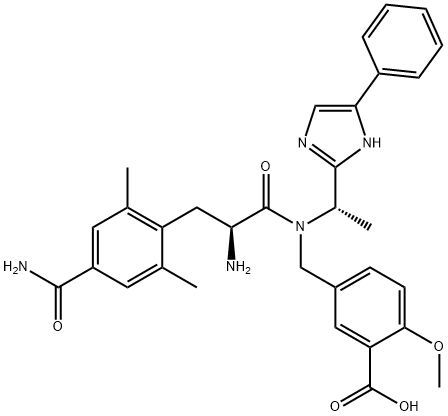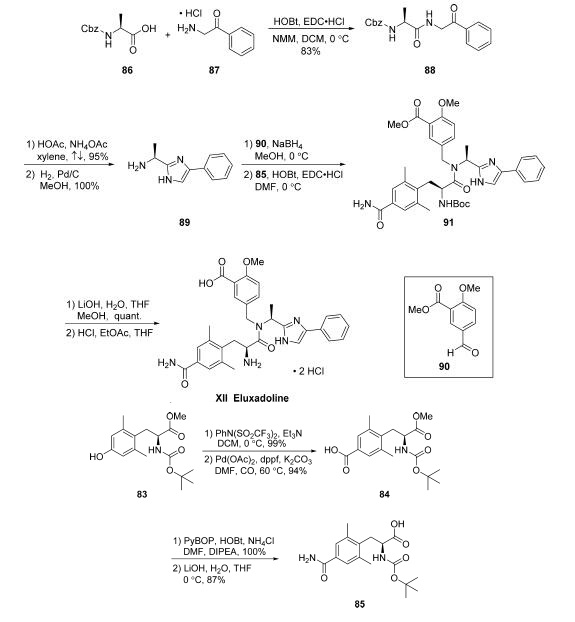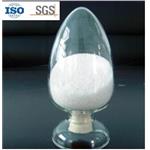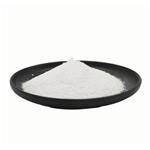
Eluxadoline
- Product NameEluxadoline
- CAS864821-90-9
- CBNumberCB12723517
- MFC32H35N5O5
- MW569.65
- EINECS1592732-453-0
- MDL NumberMFCD28386164
- MOL File864821-90-9.mol
- MSDS FileSDS
Chemical Properties
| Melting point | >180°C (dec.) |
| Boiling point | 834.2±65.0 °C(Predicted) |
| Density | 1.284±0.06 g/cm3(Predicted) |
| storage temp. | Refrigerator |
| solubility | DMSO (Slightly), Methanol (Slightly) |
| form | Solid |
| pka | 4.01±0.10(Predicted) |
| color | White to Off-White |
| InChIKey | QFNHIDANIVGXPE-FNZWTVRRSA-N |
| SMILES | C(O)(=O)C1=CC(CN(C(=O)[C@@H](N)CC2=C(C)C=C(C(N)=O)C=C2C)[C@H](C2NC(C3=CC=CC=C3)=CN=2)C)=CC=C1OC |
| CAS DataBase Reference | 864821-90-9 |
| FDA UNII | 45TPJ4MBQ1 |
| ATC code | A07DA06 |
Safety
| Symbol(GHS) |

|
| Signal word | Warning |
| Hazard statements | H361 |
| Precautionary statements | P201-P202-P281-P308+P313-P405-P501 |
| DEA Controlled Substances | CSCN: 9725 CAS SCH: IV NARC: N |
Eluxadoline Price
| Product number | Packaging | Price | Product description | Buy |
|---|---|---|---|---|
| Cayman Chemical 21522 | 10mg | $63 | Eluxadoline ≥98% |
Buy |
| Cayman Chemical 21522 | 5mg | $293 | Eluxadoline ≥98% |
Buy |
| Cayman Chemical 21522 | 25mg | $149 | Eluxadoline ≥98% |
Buy |
| Cayman Chemical 21522 | 50mg | $280 | Eluxadoline ≥98% |
Buy |
| TRC E508195 | 100mg | $640 | Eluxadoline |
Buy |
Eluxadoline Chemical Properties,Usage,Production
Overview and History
Eluxadoline is a mixed mu-opioid receptor agonist, kappa-opioid receptor agonist, and a-delta opioid receptor antagonist that can be used for the treatment of diarrhea-predominant irritable bowel syndrome(IBS-D)[1-4]. The mu-, kappa-, and delta-opioid receptors participating in regulating endogenous and exogenous opioid response in the central nervous system and peripherally in the gastrointestinal system. The agonism of peripheral mu-opioid receptors results in reduced colonic motility, while antagonism of central delta-opioid receptors results in improved analgesia, making eluxadoline usable for the symptoms of both pain and diarrhea characteristic of IBS-D[1, 4].Eluxadoline is marketed under the tradename Viberzi(FDA) in US(at may 2015)[1, 2, 4, 5]. It is an antimotility agent that decreases bowel contractions, inhibits colonic transit, and reduces ?uid/ion secretion resulting in improved symptoms of abdominal pain and reductions in the Bristol Stool Scale. It is also marketed in Europe under the trade name of “Truberzi”[3].
Indication and applications
Eluxadoline is indicated for the treatment of diarrhea-predominant irritable bowel syndrome(IBS-D). It can work directly in the intestines to slow the movement of food during digestion. Eluxadoline also makes the nerves in the intestines less sensitive to stimulation[1, 6].Mode of action
Eluxadoline takes effect through acting as the antagonist of mu-opioid receptor agonis, kappa opioid receptor agonist and a delta opioid receptor[7,8]. Eluxadoline can be used for diarrhea predominant IBS because it reduces intestinal contractility and normalizes stress-induced acceleration of upper GI transit[9]. Antagonistic activity at the delta receptor minimizes the constipating effect usually seen by mu-opioid receptor agonists alone. Because of it's limited systemic bioavailability, there may be less side effects associated with the use of eluxadoline in comparison with other therapies used to treat diarrhea predominant IBS[10].Adverse reactions
Common adverse reaction associated with Eluxadoline include constipation, nausea, abdominal pain, upper respiratory tract infection, pancreatitis, sphincter of Oddi spasm, hypersensitivity reactions, vomiting, nasopharyngitis, abdominal distention, bronchitis, dizziness, flatulence, rash, increased ALT, fatigue, viral gastroenteritis and stomach pain[4, 6, 11]. Less common adverse reactions also include gastroesophageal reflux disease, sedation, somnolence, and euphoric mood, respiration disorders such as asthma, bronchospasm, respiration failure and wheezing. Constipation was the most commonly reported adverse reaction in during the treatment by Eluxadoline. Approximately 50% of constipation events occurred within the first 2 weeks of treatment while the majority occurred within the first 3 months of therapy. Similar rates of constipation occurred between the active and placebo arms beyond 3 months of treatment. In severe cases, constipation can even lead to permanent discontinuation of drugs[11].Warning and Precaution
Eluxadoline is not approved for use by anyone younger than 18 years old[6].Eluxadoline is contradicted for administration in patients who suffer from a pancreas disorder, severe liver disease, alcoholism, and a blockage in the intestines, a gallbladder disorder, or those whose gallbladder has been removed[12].
People who are allergic to eluxadoline should also be disabled for using. In addition, it is also not allowed for patients who have a history of gallbladder, obstruction digestive problems caused by a muscle valve called the sphincter of Oddi(SFINK-ter of OD-dee), pancreas disorder, severe liver disease, a habit of drinking more than 3 alcoholic beverages per day[12, 13].
To make sure eluxadoline is safe for you; tell your doctor if you have liver disease.
It is not known whether this medicine will harm an unborn baby. Tell your doctor if you are pregnant or plan to become pregnant. It is not known whether eluxadoline passes into breast milk or if it could harm a nursing baby. Tell your doctor if you are breast-feeding a baby[12].
References
- https://www.drugbank.ca/drugs/DB09272
- "Viberzi[eluxadoline] Tablets, for Oral Use, CIV. Full Prescribing Information". Actavis Pharma, Inc. Parsippany, NJ 07054 USA. Retrieved 26 December 2015.
- "Truberzi". European Medicines Agency. 29 September 2016.
- https://www.accessdata.fda.gov/drugsatfda_docs/label/2015/206940s000lbl.pdf
- Cash, B. D. "Eluxadoline: a promising therapy that raises many questions. " Translational Gastroenterology & Hepatology 1(2016]: 76.
- https://www.everydayhealth.com/drugs/eluxadoline
- Fujita, Wakako, et al. "Molecular characterization of eluxadoline as a potential ligand targeting mu-delta opioid receptor heteromers." Biochemical Pharmacology 92.3(2014]: 448-456.
- Levycooperman, N, et al. "Abuse Potential and Pharmacodynamic Characteristics of Oral and Intranasal Eluxadoline, a mixed μand κ-Opioid Receptor Agonist and δ-Opioid Receptor Antagonist. " Journal of Pharmacology & Experimental Therapeutics 359.3(2016]: 471-481.
- Chen, Hong Yu, J. J. Feng, and T. T. Song. "Eluxadoline, a new drug for treating diarrhea-predominant irritable bowel syndrome." Chinese Journal of New Drugs[2017].
- Davenport JM, Covington P, Bonifacio L, McIntyre G, Venitz J: Effect of uptake transporters OAT3 and OATP1B1 and efflux transporter MRP2 on the pharmacokinetics of eluxadoline. J Clin Pharmacol. 2015 May; 55(5]: 534-42. doi: 10.1002/jcph.442. Epub 2015 Jan 14.
- https://www.rxlist.com/viberzi-drug.htm
- https://www.drugs.com/viberzi.html
- Gawron, A. J., and K. Bielefeldt. "Risk of Pancreatitis Following Treatment of Irritable Bowel Syndrome with Eluxadoline." Clinical Gastroenterology & Hepatology the Official Clinical Practice Journal of the American Gastroenterological Association 16.3(2017].
Description
Eluxadoline, originally developed by Janssen and currently marketed by Allergan (formerly Actavis), was approved in May 2015 by the FDA for the treatment of diarrhea-predominant irritable bowel syndrome (IBS-D). Eluxadoline, an orally dosed agent, employs a unique mechanism for IBS-D treatment, as it functions simultaneously as a μ- and κ-opioid receptor agonist and a δ- opioid receptor antagonist, leading to a first-in-class therapy for treatment of IBS-D. Specifically, in animal studies, eluxadoline was found to interact with opioid receptors in the gut, inhibiting neurogenically mediated secretion and reducing intestinal contractility. Additionally, the treatment led to a decrease in stress-induced acceleration of upper GI transit without causing rebound constipation, earning its mark as a first-line therapeutic treatment for IBS-D. In two phase III clinical trials of over 2400 patients with IBS-D, patients taking eluxadoline showed a greater improvement toward the end point (≥30% improvement from their baseline IBS-D score on at least 50% of days treated with eluxadoline) compared to patients treated with placebo.Uses
Eluxadoline is an orally-active drug used to reduce symptoms of irritable bowel syndrome such as diarrhea and abdominal pain.Definition
ChEBI: An amino acid amide obtained by the formal condensation of the carboxy group of 4-carbamoyl-2,6-dimethyl-L-phenylalanine with the secondary amino group of 2-methoxy-5-({[(1S)-1-(4-phenylimidazol-2-yl)ethyl]amino}methyl)ben oic acid. It has mixed opioid receptor activity and is used for treatment of irritable bowel syndrome with diarrhoea.Pharmacokinetics
Following oral administration of 100 mg VIBERZI in healthy subjects, the Cmax of eluxadoline was approximately 2 to 4 ng/mL, and AUC was 12 to 22 ng. h/mL. Eluxadoline has approximately linear pharmacokinetics with no accumulation upon repeated twice-daily dosing. The variability of eluxadoline pharmacokinetic parameters ranges from 51% to 98%.Absorption: The absolute bioavailability of eluxadoline has not been determined. The median Tmax value was 1.5 hours (1 to 8 hours) under fed conditions and 2 hours (range: 0.5 to 6 hours) under fasting conditions.
The administration of VIBERZI with a high-fat meal that contained approximately 800 to 1000 total calories, with 50% of calories derived from fat content, decreased the Cmax of eluxadoline by 50% and AUC by 60%.
Distribution: Plasma protein binding of eluxadoline was 81%.
Elimination: The mean plasma elimination half-life of eluxadoline ranged from 3.7 hours to 6 hours.
Metabolism: The metabolism of eluxadoline is not established. There is evidence that glucuronidation can occur to form an acyl glucuronide metabolite.
Excretion: Following a single oral dose of 300 mg [14C] eluxadoline in healthy male subjects, 82.2% of the total radioactivity was recovered in feces within 336 hours and less than 1% was recovered in urine within 192 hours.
Clinical Use
Mixed mu-opioid receptor agonist, kappa-opioid receptor agonist, and a-delta opioid receptor antagonist:Treatment of irritable bowel syndrome with diarrhoea
Synthesis
The synthesis of eluxadoline begins with preparation of advanced coupling component 85, which could be completed via a four-step route from commercially available N-Bocprotected aminoester 83 . Triflate formation using N-phenyltrifluoromethanesulfinimide in DCM under basic conditions led to nearly quantitative yield of the desired triflate, which was subjected to a carbonylation reaction to yield aryl acid 84 in 94% yield. Employing NH4Cl as a source of ammonia, amidation of 84 took place in the presence of PyBOP/HOBt and DIPEA in DMF. Finally, acid 85 was revealed upon methyl ester saponification with aqueous LiOH in THF. This sequence provided 85 without purification.With coupling component 85 in hand and initiated from a HOBt and EDC?¤HCl-mediated coupling of commercial N-Cbz-L-alanine (86) with commercial 2-amino acetophenone hydrochloride (87) to provide intermediate 88 in 83% yield. Addition of NH4OAc and AcOH to a suspension of 88 in refluxing xylenes furnished the desired imidazole in excellent yield (95%). Submission of this N-Cbz-imidazole to hydrogenation conditions (H2, Pd/C, MeOH) enabled liberation of the free amine to access 89 in quantitative yield following filtration and concentration. From intermediate 89, reductive amination with commercially available aryl aldehyde 90 under standard conditions (NaBH4, MeOH) followed by subsequent coupling of the corresponding crude amine with acid 85 using HOBt/EDC?¤HCl enabled formation of the carbon framework of eluxadoline (91). Saponification of the ester within 91 with LiOH in MeOH/THF yielded the corresponding acid in quantitative yield. Immediate subjection of this intermediate to acidic conditions (HCl in EtOAc/THF) led to N-Boc cleavage and isolation of eluxadoline (XII) as the bis-HCl salt in 71% yield, requiring no further purification.
It should be noted that since this initial report, additional details for the isolation of eluxadoline in high purity in various crystal forms and as a zwitterion have been reported,66 although most reported routes described isolation of this drug in its HCl salt form.

Drug interactions
Potentially hazardous interactions with other drugs Antibacterials: concentration possibly increased by rifampicin - avoid. Antivirals: concentration possibly increased by atazanavir, lopinavir, ritonavir, saquinavir and tipranavir - avoid. Ciclosporin: concentration of eluxadoline increased - avoid. Lipid-lowering agents: concentration possibly increased by gemfibrozil - avoid.Metabolism
Eluxadoline is mainly excreted in the faeces, either as unabsorbed active substance or via the biliary system with the kidney playing a minimal role in elimination.Preparation Products And Raw materials
Eluxadoline Supplier
Global(177)Suppliers
| Supplier | Tel | Country | ProdList | Advantage | ||
|---|---|---|---|---|---|---|
| +16313385890 | info@protheragen-ing.com | United States | 3868 | 58 | ||
| +86-18600796368 +86-18600796368 |
sales@sjar-tech.com | China | 484 | 58 | ||
| +86-(0)57185586718 +86-13336195806 |
sales@capot.com | China | 29792 | 60 | ||
| 010-60279497 | sales01@cooperate-pharm.com | CHINA | 1803 | 55 | ||
| +86-0371-55170693 +86-19937530512 |
info@tianfuchem.com | China | 21632 | 55 | ||
| +undefined-21-51877795 | ivan@atkchemical.com | China | 32965 | 60 | ||
| +86-0371-86658258 +8613203830695 |
sales@coreychem.com | China | 29871 | 58 | ||
| 18905173768 | sales@dolonchem.com | CHINA | 2972 | 58 | ||
| +86 17788583750 | sales@cyanochem.com | CHINA | 281 | 58 | ||
| 0086-182-6772-3597 | sales04@yibaibiotech.com | CHINA | 419 | 58 |
864821-90-9, EluxadolineRelated Search
PROMPT×
PROMPT
The What'sApp is temporarily not supported in mainland China
The What'sApp is temporarily not supported in mainland China
Cancel
Determine


